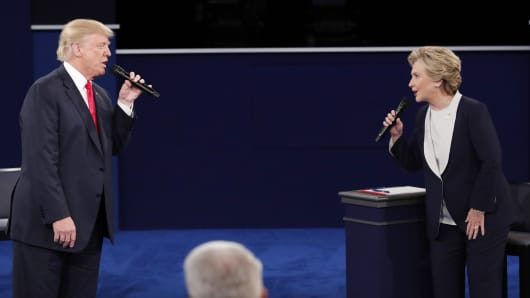Everyone agrees the U.S. tax code is "broken" and needs fixing.
That, however, is where any agreement between presidential candidates Republican Donald Trump and Democrat Hillary Clinton ends.
And while both candidates have put forth a series of tax reform proposals, the details left undefined provide more open questions than the hundreds of loopholes in the existing tax code. Still, the two candidates have advocated tax policies with broadly different goals for the way the government raises money from American households and companies.
The stark divide flared again in Sunday night's acrimonious debate, much of which quickly devolved into insults and character attacks.
Some of the fiercest punches were thrown over the issue of taxes — and the candidates' plans change the rules that determine how much Americans pay their government.
"We're cutting taxes for the middle class and I will tell you we are cutting them big league," Trump told the town hall audience in St. Louis. "And I will tell you: Hillary Clinton is raising your taxes, folks ... what that is going to do is a disaster for the country."
While Clinton has proposed a series of tax increases for wealthy households, she was quick to counterattack Trump's tax cut proposals.
"Everything you've heard just now from Donald is not true," she said. "His plan will give the wealthy and corporations the biggest tax cuts they have ever had, more than the Bush tax cuts by at least a factor of two. Donald always takes care of Donald and people like Donald and this would be a massive gift."
Regardless of their campaign promises, any pledge to "reform" the U.S. tax code needs to be taken with a large grain of salt.
For one thing, any attempt to change the laws requires the approval of a deeply divided Congress, which has tried multiple times to reach a consensus on a comprehensive overhaul of the tax code.
Congress routinely tinkers around the edges of the tax law, offering incentives and breaks for a variety of companies industries and other constituencies. That's one reason the code has become so convoluted and inefficient.
It's also why comprehensive reform has been so difficult to achieve. In the recent past, any attempt to develop a comprehensive overhaul has sparked a feeding frenzy of lobbying by hundreds of interested parties determined to defend their favorite provisions of the tax laws.
But the proposals do provide some insights into the broader policies each candidate would promote if elected next month.
One of those relates to a relatively obscure rule governing something called "carried interest" that has generated a lot of attention.
The rule applies to income for investment managers who earn money from a share of the gains they generate from investing other people's money. In some cases, these money managers are allowed to pay taxes on this income at the relatively lower capital gains tax rate on investments, instead of the higher tax rate applied to ordinary income.
Critics of the rule argue that it gives an unfair tax break on the income earned by wealthy people who manage hedge funds or real estate compared to middle-income workers who get a paycheck every week.
Both candidates have said they would eliminate the rule but the change, by itself, wouldn't necessarily force those who currently use it to pay a higher rate unless other loopholes were also closed. Clinton has said she wants to create a minimum tax for anyone making more than $1 million a year, for example.
But the recent disclosure of a summary of Trump's 1995 tax returns demonstrates the rules determining just how much someone "makes" are complex and often used to shield income from taxes. While little is known about the details behind Trump's tax summary, the documents show, and Trump has confirmed, that by declaring nearly $1 billion in business losses that year he was able to avoid paying income taxes. That loss could have let him pay no income tax for as many as 18 years.
Both candidates have argued that their proposed changes to the tax code would spur growth and create jobs. But even in the unlikely event that Trump or Clinton, once elected, were to succeed in enacting their respective plans, those claims are all but impossible to assess.
Tax policy does play an important role in promoting economic growth and creating jobs, but estimating the impact requires making a number of assumptions that may or may not prove correct.
That said, several tax and budget watchdog groups have taken a shot at making sense of Clinton's and Trump's proposals.
One group, the Committee for a Responsible Federal Budget, has estimated that Clinton's plan, which includes tax increases on the highest earners, would add $200 billion to the national debt over a decade.
Trump's plan, which includes broad tax cuts, would increase the debt by $5.3 trillion, the group estimates.
Measured in relation to the overall economy, the debt would rise to above 86 percent of GDP under Clinton's plan and 105 percent under Trump, according to the group's recently updated analysis.



